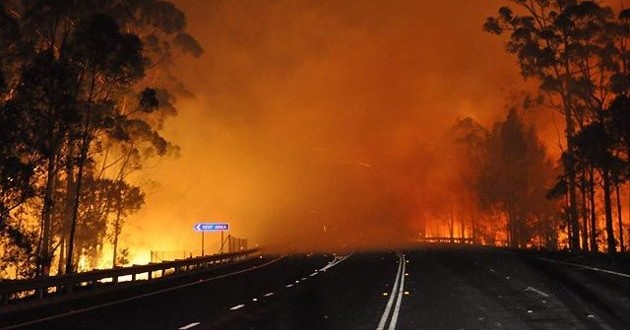Australia’s scorching heat wave of 2013, which triggered fierce bushfires and broke more than 100 temperature-related records, including one for the country’s hottest day ever recorded, would have been virtually impossible without climate change, a new report says.
According to the Bureau of Meteorology, the national average of daily temperatures in 2013 had rise to record-breaking levels for an extended period. NASA had noted that Australia’s extreme temperatures in Jan. 2013 were extended not just days but weeks, The Washington Post reports.
A new report by Australia’s independent Climate Council has found that 2013, the country’s hottest year ever, would be “virtually impossible” without climate change. The summer heatwaves of late 2012 and early 2013 were also enhanced by global warming and increased the chance of reaching extreme temperature levels.
The Climate Council report was written by Will Steffen, a professor at the Australian National University, and based his research on several climate change models. The high-powered models simulate temperatures with and without human-added climate factors. Researchers have compared a given set of temperatures in one world where greenhouse gases exist in the atmosphere and in another model with no climate change.
The report said that in a world without global warning, the record-breaking temperature Australia experienced in 2013 would happen “once out of every 12,300 years.” Steffen found that record hot days in Australia have doubled in the last 50 years. In the past decade, frequent records were set for extremely hot days than cold ones.
Steffen warned that heatwaves across the country have become hotter as they occur earlier and more frequently. He said Australia must start harnessing its renewable energy sources and stop relying on fossil fuels like coal.
The professor said the report highlighted the importance of developing an action plan to reduce emissions. If something is not done, Steffen warned that an extreme heat event would be a normal occurrence by the middle of the century.
Climate Council chief councillor Professor Tim Flannery said the report allowed scientists to “quantify” the effect of human activities on extreme weather events, reports ABC. He said Australia should reduce greenhouse gas emissions if it wants to achieve a better climate in the future.
Agencies/Canadajournal

 Canada Journal – News of the World Articles and videos to bring you the biggest Canadian news stories from across the country every day
Canada Journal – News of the World Articles and videos to bring you the biggest Canadian news stories from across the country every day


Naturally, the extreme snowfall events in Eastern North American can only be explained by Climate Change and emissions.
Actually, yes, CC does explain clearly greater snowfall.
Warmer air masses (still below freezing) can hold more moisture, therefore, dump more snow.
This is Grade 9 science.
Guess that explains the lack of snow on the southwest coast of Canada. Ski hills are shutting down, even whistler is getting rain.